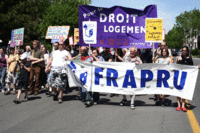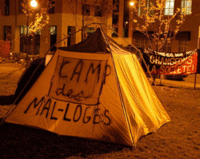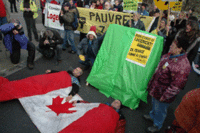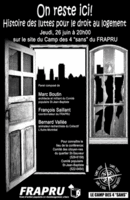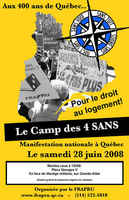The celebration of Quebec’s 400 years: the ‘4-Lesses’ Camp
The 4-Lesses are, the homeless, the penniless, the less privileged, and the voiceless. These are persons and families throughout Quebec, who face housing and nomadic problems, those who are denied the right to housing on a daily basis.
The 4-Lesses Camp from the 26th to 28th June 2008
The exact location will be announced on June 26th. For information on the location, call: 418-522-0454 ; 418-529-6158 ; 418-651-0979 from 11 am on this date
On Thursday June 26th many among them will pitch their tents in the heart of the Old Capital to put up a makeshift camp that that they will use day and night. The 4-Lesses Camp will also be the venue of a series of activities that are open to everyone. It will end on Saturday June 28th with a large demonstration in the streets of Quebec.
Events summary:
The current situation, their demands, programme details, demonstration venue, etc., the “Abitation” from Champlain to today.
Housing still remains a problem
As journalist Louis-Guy Lemieux wrote in Le Soleil on February 23rd 2008, Samuel de Champlain’s priority when he arrived in Quebec was to “build a huge accommodation to house everyone.” Four hundred years after the construction of this “Abitation”, the housing problem affects all of Quebec, as it does the rest of the province.
Still, as the UN states, housing, which is “a place where we can live in security, peace and dignity”, is a basic right.
In Quebec, many persons and families continue to be denied this right. Many of them, among which are an increasing number of women and youths, are homeless and without the assurance of a stable and safe roof. On a much larger scale, housing gobbles up 30%, 50% or even 80% of the salaries of many, and they ask themselves monthly, what should be the priority: rent or food? Many live in extremely small, and poor quality apartments, which are dangerous to their health and security.
Unoccupied housing is very rare, so much so that renting an apartment presents so many obstacles, especially for households most susceptible to discrimination, such as families with children, persons receiving social welfare benefits, or visible minorities.
The human drama behind the figures
In the 2006 census, 448 840 households that rented in Quebec, dedicated more than the norm of 30% of their salaries on rent. Of this figure, 203, 085 households spent more than 50% of their salary on rent.
Finding housing for rent throughout Quebec is rare. Here, the rate of unoccupied apartments, which should normally be 3%, is only 1.2%. This figure falls to 0.9% for housing for families.
In Quebec, the average rent rose by almost 25% between 2000 and 2007. Here, rental of a two-bedroom housing costs $641, compared to $518 in 2000.
An increasing number of households cannot pay their rent. Last year, 45,706 cases of non-payment of rents, which led to the eviction of tenants, were reported to the Housing Authority. This is 6,000 more than in 2000.
In the indigenous regions of Quebec, housing conditions resemble those in the third world: one in three household is overpopulated, one in five is in need of major repairs, and one in ten has major mould problems.
In May 2006, a UN committee requested that Canada and the provinces “consider the fight against the phenomenon of homelessness and the lack of housing a national emergency.” This pressing demand was reiterated in 2007 by the UN Special Rapporteur on the right to housing, at the end of an observer mission to Canada.
However, Stephen Harper’s federal government continues to wash its hands of the matter. It has not allocated an extra cent to the social housing budget since its arrival to power in January 2006, while it has accrued a budget surplus of at least 37 billion dollars. It has also increased the annual budget of the Ministry of National Defence by 37%, taking it to a record of 18 billion dollars for 2008-2009.
Jean Charest’s Quebec government continues to invest year after year in social housing, but at a rate that is purely insufficient. At the moment, the outlook for social housing can be summed up by the 2000 new homes announced in the March 13 budget; which is a scant figure in relation to the demand.
An objective: double the number of social housing
The current situation attests to it: the private housing market is incapable of respecting the right to housing for everyone. This is the reason why social housing is so important.
What is social housing? It is housing that does not belong to a private interest and from which no one makes a profit. There are three such types:
HLMs, which are public housing for low-income households. No such housing has been built since 1994, while throughout Quebec, 42, 000 households are gathering dust from being on waiting lists for HLMs.
Housing cooperatives , where tenants collectively manage their own homes.
Housing operated by Non-profit Organisations (NPOs) where volunteers are involved in improving housing conditions in their surroundings.
In Quebec, all these types of housing represent only 10% of all housing for rent. This is far from the figures in European countries, where it accounts for 50% and sometimes 60% of housing for rent.
The allotment of social housing needs to be seriously improved. Which is why FRAPRU is demanding that Quebec fixes a huge objective: to double the number of social housing, which is currently at 120,00, within a reasonable time frame. Such an objective implies a major increase in investment by the federal as well as the Quebec government. It will have serious effects on the social as well as economic front.
4-Lesses Camp Activities
- Workshop on housing in France and the struggle of poorly housed families of the rue de la Banque in Paris, presented by the French Association for the Right to Housing.
- Workshop on today’s right and left wing, presented by the Regroupement d’éducation populaire en action communautaire of Québec-Chaudière-Appalaches.
- Workshop on the struggle of social welfare beneficiaries against prejudices, presented by ROSE of the Northern Quebec Association for the Defence of Social rights in the Quebec metropolitan area.
Panel on the history of housing in Quebec and the struggle for the right to housing, with Bernard Vallée (host & researcher of Collectif L’Autre Montréal), Marc Boutin (Architect and supporter of the Comité populaire Saint-Jean-Baptiste) and François Saillant (coordinator of FRAPRU).
Political corner: Invitations have been sent to the federal and Quebec government as well as to Quebec’s political parties.
- Workshop on mutual solidarity and the handing over of international contacts, presented by the No Vox network.
- Workshop on social struggles of today and yesterday, presented by Regroupement d’éducation populaire en action communautaire of Québec-Chaudière-Appalaches
- Fair trade workshop, presented by Nagua Plan
Presentation on the living and housing conditions of the Indigenous peoples. Hosted by a representative of the Assembly of First Nations of Quebec.
FRAPRU- FRAPRU is the Front d’action populaire en réaménagement urbain , a national social lobby group for the right to housing. It will celebrate its 30 years of existence in autumn. FRAPRU consists of 127 groups across the regions of Quebec, with 12 groups in Quebec itself. Among the ones in Quebec proper, there are two of the oldest community groups of the national capital, i.e. The Citizens’ Committee of Saint-Sauveur Area and The Saint the Baptist Popular Committee. The Assisted-Housing for Tenants in Western Quebec Committee is also a member.

